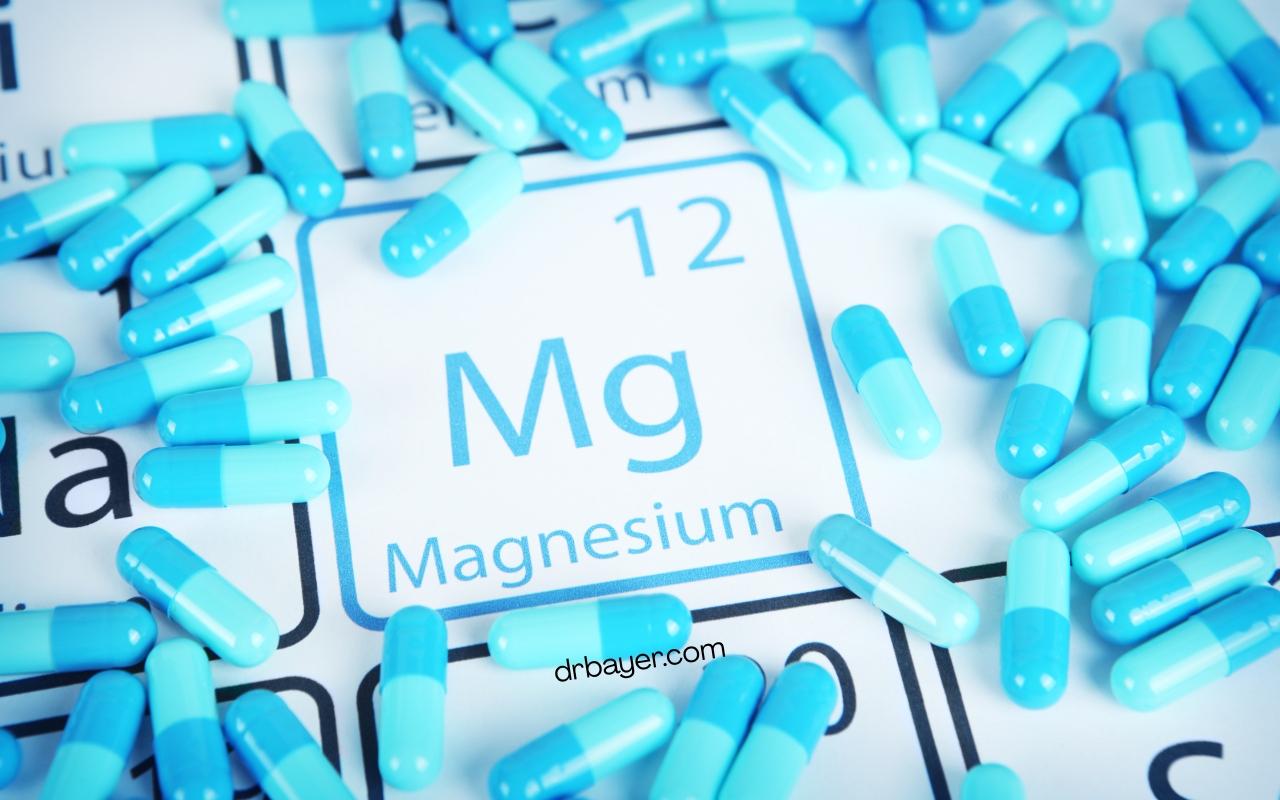
Magnesium is one of the most essential yet underappreciated minerals in maintaining overall health. While it is often discussed in the context of muscle recovery or sleep support, magnesium is actually involved in hundreds of physiological functions, impacting everything from heart health to stress regulation.
At DrBayer.com, our wellness team is dedicated to providing evidence-based, holistic health insights that empower individuals to make informed choices. This guide explores why magnesium is gaining recognition in the medical and wellness communities, its role in preventing chronic disease, and how to optimize your intake for long-term health.
Why Magnesium is Critical for Holistic Health
Magnesium plays a fundamental role in over 300 biochemical processes in the body. It supports multiple systems, including:
- Nervous System Health: Regulates neurotransmitters, reducing stress and anxiety.
- Cardiovascular Function: Helps control blood pressure, supports healthy arteries, and regulates heart rhythm.
- Metabolism and Energy Production: Assists in converting food into energy and optimizing glucose metabolism.
- Muscle and Bone Health: Prevents muscle cramping and supports bone density alongside calcium and vitamin D.
- Sleep and Recovery: Promotes relaxation and aids in sleep quality by influencing melatonin production.
Are You at Risk of Magnesium Deficiency?
Even though magnesium is present in a variety of foods, many people do not get enough of it due to modern dietary habits, stress, and certain medical conditions.
Common Causes of Magnesium Deficiency
- Poor Diet: Highly processed foods lack magnesium, and nutrient depletion in soil has reduced natural food sources.
- Digestive Disorders: Conditions like Crohn’s disease, IBS, or frequent diarrhea impair magnesium absorption.
- Excessive Exercise or Sweating: Athletes and highly active individuals lose magnesium through sweat.
- Chronic Stress and Poor Sleep: Increased cortisol levels can contribute to magnesium depletion.
- Medication Use: Diuretics, proton pump inhibitors (PPIs), and certain antibiotics can reduce magnesium levels.
Signs You May Need More Magnesium
- Persistent muscle cramps or spasms
- Chronic fatigue or low energy
- Insomnia or frequent nighttime awakenings
- High blood pressure or irregular heart rhythms
- Mood swings, anxiety, or increased stress levels
Magnesium’s Role in Disease Prevention
1. Heart Disease and Hypertension
Magnesium helps regulate blood pressure by relaxing blood vessels and improving circulation. Studies suggest that individuals with higher magnesium intake have a lower risk of cardiovascular disease and stroke.
2. Diabetes and Blood Sugar Control
Magnesium plays a role in insulin function and glucose metabolism. Research shows that adequate magnesium intake is associated with a reduced risk of type 2 diabetes.
3. Stress, Anxiety, and Mental Health
Magnesium is crucial for brain function and mood regulation. It helps modulate the body’s response to stress and has been linked to lower levels of anxiety and depression.
4. Bone Density and Osteoporosis Prevention
Magnesium supports bone health by assisting in calcium absorption. A deficiency in magnesium can contribute to bone fragility and increase the risk of osteoporosis.
Natural Sources of Magnesium
To naturally boost magnesium intake, focus on incorporating these nutrient-rich foods:
- Leafy greens (spinach, Swiss chard, kale)
- Nuts and seeds (almonds, pumpkin seeds, cashews)
- Whole grains (brown rice, quinoa, oats)
- Legumes (black beans, chickpeas, lentils)
- Fatty fish (salmon, mackerel)
- Dark chocolate (at least 70% cacao)
Magnesium Supplements: When and What to Take
For those who struggle to get enough magnesium from food alone, supplementation may be beneficial. However, not all forms of magnesium are the same.
Best Types of Magnesium for Different Needs
- Magnesium Glycinate: Best for relaxation, sleep support, and reducing stress.
- Magnesium Citrate: Highly bioavailable and commonly used for digestion and constipation relief.
- Magnesium L-Threonate: Known for its ability to cross the blood-brain barrier and support cognitive function.
- Magnesium Malate: Helps with energy production and muscle recovery.
- Magnesium Oxide: High in magnesium content but has lower bioavailability.
If you suspect a deficiency, consult with a healthcare provider to determine the best form and dosage for your individual needs.
How to Optimize Magnesium for Holistic Health
- Eat a Whole-Food Diet: Prioritize magnesium-rich foods in your daily meals.
- Monitor Your Intake: The recommended daily intake is 400-420 mg for men and 310-320 mg for women.
- Stay Hydrated: Magnesium works with electrolytes like sodium and potassium to maintain hydration and prevent muscle cramps.
- Use Targeted Supplementation: Choose a high-quality magnesium supplement that fits your health goals if needed.
Final Thoughts: The Growing Importance of Magnesium
Magnesium is essential for a balanced, holistic approach to health. Whether you are looking to optimize heart function, support mental clarity, improve muscle recovery, or enhance sleep, ensuring adequate magnesium intake is a simple yet effective step toward better wellness.
At DrBayer.com, we advocate for a science-backed, natural approach to health. If you are considering magnesium supplementation, consult a medical professional to tailor the right approach for your unique needs and ensure long-term benefits.
